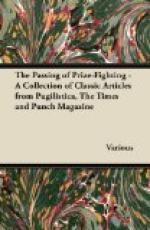The dressing-case you lately gave
Was fit, I know, for Bagdad’s
caliph;
I used it only once to shave,
When it was taken by the bailiff.
Than thou didst give I bring back less;
But hear the truth, without
more dodging—
The landlord’s been with a distress,
And positively cleared my
lodging.
* * * * *
CONS. BY O CONNELL.
What English word expresses the Latin for cold?—“Jelly"-does (Gelidus).
Why is a blackleg called a sharper?—Because he’s less blunt than other men.
Why is a red-herring like a Mackintosh?—Because it keeps one dry all day.
* * * * *
PUNCH’S THEATRE.
OLD MAIDS.
Sir Philip Brilliant is a gentleman of exquisite breeding—a man of fashion, with a taste for finery, and somewhat of a fop. He reveals his pretty figure to us, arrayed in all the glories of white and pink satins, embellished with flaunting ribbons, and adorned with costly jewels. His servant is performing the part of mirror, by explaining the beauties of the dress, and trying to discover its faults: his researches for flaws are unavailing, till his master promises him a crown if he can find one—nine valets out of ten would make a misfit for half the money; and Robert instantly pays a tribute to the title of the play by discovering a wrinkle—equally an emblem of an “Old Maid” and an ill-fitting vest. This incident shows us that Sir Philip is an amateur in dress; but his predilection is further developed by his exit, which is made to scold his goldsmith for the careless setting of a lost diamond. The next scene takes us to the other side of Temple-bar; in fact, upon Ludgate-hill. We are inside the shop of the goldsmith, Master Blount, most likely the founder of the firm now conducted by Messrs. Rundell and Bridge. He has two sons, who, being brought up to the same trade, and always living together, are, of course, eternally quarrelling. Both have a violent desire to cut the shop; the younger for glory, ambition, and all that (after the fashion of all city juveniles, who hate hard work), the elder for ease and elegance. The papa and mamma have a slight altercation on the subject of their sons, which happily, (for family quarrels seldom amuse third parties) is put an end to by a second “shine,” brought about by the entrance of Sir Philip Brilliant, to make the threatened complaint about bad workmanship. The younger and fiery Thomas Blount resents some of Sir P.B.’s expressions to his father; this is followed by the usual badinage about swords and their use. We make up our minds that the next scene is to consist of a duel, and are not disappointed.
Sure enough a little rapier practice ends the act; the shopman is wounded, and his adversary takes the usual oath of being his sworn friend for ever.




